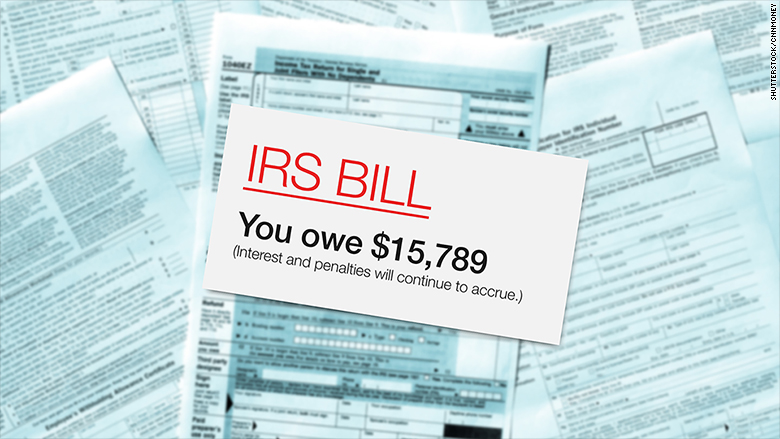
by Renee Lawson | Jul 8, 2024 | Tax Preparation, Tax Resolution
The amount of stress you face when you owe a significant amount of money to the IRS can feel insurmountable. Penalties and interest keep adding on to the debt, and it can feel like there’s often no way out.
Oftentimes, people will consider bankruptcy as their only option to get back on their feet, but they overlook an option that many times proves to be more advantageous and strategic, which is hiring a tax relief professional.
Let’s explore five compelling reasons why opting for tax relief services may be preferable to filing for bankruptcy.
1. Tailored Tax Solutions
Tax relief professionals are specialized when it comes to navigating the complexities of tax laws and IRS procedures. They provide personalized strategies tailored to your specific financial situation.
Unlike bankruptcy, which is a broad legal process that impacts all debts that are owed, tax relief professionals focus specifically on resolving tax-related issues.
They will take the time to assess your tax liabilities, handle all of the negotiations with the IRS on your behalf and develop comprehensive plans to help you reduce or settle your tax debts in the most effective manner.
2. Avoiding Permanent Financial Consequences
Bankruptcy can have long-term financial repercussions, including damaging your credit score and limiting future financial opportunities. It remains on your credit report for several years, and can impact your ability to secure loans, mortgages, or even certain job opportunities.
In contrast, working with a tax relief professional simply aims to resolve your tax debts without the severe and lasting consequences of bankruptcy. They are there to help protect your financial standing and work towards maintaining your financial health in the long term.
3. Preservation of Assets
Filing for bankruptcy often involves liquidating assets or following a court-mandated repayment plan. This process can result in the loss of valuable assets such as homes, vehicles, or personal possessions.
Tax relief professionals prioritize protecting your assets while negotiating with the IRS to settle tax debts through manageable repayment plans or other arrangements. They are advocates for you and the solutions that allow you to retain ownership of your essential assets, and in turn preserving your financial stability and peace of mind.
4. Expert Negotiation Skills
Navigating IRS negotiations requires in-depth knowledge of tax laws and procedural intricacies. Tax relief professionals possess extensive experience in dealing with the IRS, and they understand all the nuances of tax debt resolution and negotiation techniques.
They will leverage their expertise to achieve favorable outcomes for you and minimize the penalties or interest charges associated with any unpaid taxes.
5. Comprehensive Financial Guidance
Beyond resolving tax debts, tax relief professionals offer more holistic guidance. They assess your overall financial situation, providing insights into tax planning strategies, budgeting, and future financial management.
It’s a proactive approach that helps you avoid future tax problems and establish more sound financial practices that will help you maintain compliance with tax laws.
From personalized tax solutions and asset protection to expert negotiation skills and comprehensive financial guidance, tax relief professionals will work diligently to help resolve your tax issues effectively.
They will prioritize your financial well-being and aim to achieve a sustainable debt relief plan all while safeguarding your financial future.
If you owe $10,000 or more in back taxes and are facing a decision of whether to file for bankruptcy or pay your tax debt, contact the professionals at Action Tax Relief today at 937-268-2737 for a free, no-obligation consultation. We are happy to answer any questions that will help you make the right decision for you.

by Renee Lawson | Jun 24, 2024 | Tax Preparation, Tax Resolution
Imagine checking your mail or email to find a notice from the IRS stating that you owe money. Whether the amount is small or substantial, it can likely trigger some immediate concern or even anxiety.
The bill might catch you off guard, or it could result from a tax return adjustment where the IRS found discrepancies from what you reported on your income or deductions when you filed your taxes.
Rest assured, help is available. The key to managing this situation effectively simply lies in understanding all the steps you need to take next. Handling it properly can prevent additional penalties, interest, and potential legal issues.
By following a clear and informed approach, you can navigate this challenge with confidence and reduce the stress that comes with it. Let’s walk through each step to ensure you address the tax bill as efficiently as possible to help make the process as smooth as possible.
Note: If the IRS is claiming you owe $10,000 or more, contact the experts at Action Tax Relief immediately for a consultation www.actiontaxrelief.com
Step 1: Don’t Panic, But Don’t Ignore It
Opening a letter from the IRS to let you know you owe money can be alarming, but it’s crucial not to panic. Ignoring the bill isn’t going to make it go away and could just lead to more severe consequences, such as increased penalties, interest, and potential legal action.
Stay calm and read the notice very carefully to understand why you owe the money and exactly how much is due.
Step 2: Verify the Details
Before you take any action, verify that the bill is accurate. The IRS can make mistakes, and so can taxpayers. Compare the IRS notice with your tax return and all of your supporting documents.
Be vigilant to look for discrepancies or potential errors. If you believe there’s a mistake, you’ll need to gather any and all evidence you possibly can to back up your claim.
Step 3: Understand Your Payment Options
The IRS provides several payment options to help taxpayers settle their bills:
- Pay in Full: If possible, paying the full amount by the due date will stop any further interest or penalties from accruing.
- Installment Agreement: If you can’t pay the full amount at once, you can apply for an installment agreement, which would allow you to make monthly payments.
- Offer in Compromise: In cases of significant financial hardship, you may qualify for an Offer in Compromise, which allows you to settle your tax debt for less than the full amount owed.
- Temporary Delay: If paying the bill would prevent you from covering basic living expenses, you can request a temporary delay of the collection process.
Step 4: Communicate with the IRS
If you have questions or need to discuss payment options, don’t hesitate to contact the IRS. The notice you received will include a contact number. Be prepared with your tax information and any relevant documents when you call.
Having clear communication with the IRS can help you better understand your situation and help find a resolution that works for you.
However, it’s not always easy to get in touch with the IRS, which is another reason why having experts like the ones at Action Tax Relief on your side is beneficial. We take care of the communication for you.
Step 5: Respond Promptly
Timely action is crucial. The IRS sets deadlines for payment and responses to notices. Missing these deadlines can result in additional penalties and interest, which is just adding to the tax bill owed.
Make sure you’re aware of the dates and respond when indicated in the notice. Whether you’re paying the bill, disputing the amount, or requesting a payment plan, get in touch with the IRS on time.
Step 6: Keep Detailed Records
Throughout the process, you must keep meticulous records of all communications with the IRS, payments made, and any documents sent or received. These records will be your backup in the event there are any disputes or if you need to reference them in the future.
Receiving a tax bill from the IRS doesn’t have to be a nightmare. By staying calm, verifying the details, understanding your payment options, and communicating effectively with the IRS, you can navigate this challenge more easily.
If you’ve received a tax bill from the IRS and owe $10,000 or more, contact the tax resolution experts at Action Tax Relief at 937-268-2737.
We’re here to help you understand your options and make the process as easy as possible. Reach out today for a free, no-obligation consultation and take the first step towards resolving your tax debt with confidence.

by Renee Lawson | Jun 21, 2024 | Tax Resolution
Facing an IRS audit can be an extremely nerve-wracking experience. The questions, concerns, and overwhelming “what-if” thoughts can easily take over.
However, understanding the actual audit process and knowing how to prepare can help alleviate much of the stress associated with it.
Rest assured, this article will identify why someone may be audited, what exactly is involved in an IRS audit, and the possible steps to take to be fully prepared.
Why Am I Being Audited?
The IRS may initiate an audit for various reasons. Here are some common triggers for audits:
- Finding discrepancies in tax returns
- Having high income levels
- Claiming unusual or excessive deductions
- Being self-employed
- Finding inconsistencies compared to third-party reports
- Having a history of previous audits
- Being selected randomly
Receiving an audit notice doesn’t always indicate wrongdoing, but it’s essential to respond promptly and to cooperate fully with the IRS to address any concerns so that the audit can be resolved as efficiently as possible.
What Does The IRS Audit Process Look Like?
What is an IRS audit, anyway? In a nutshell, it’s an examination of an individual’s or business’ financial information and records to make sure that they are in compliance with tax laws and regulations.
Typically, there are three main types of IRS audits: correspondence audits, office audits, and field audits. Correspondence audits are usually conducted through the mail, while office audits and field audits involve in-person meetings with IRS agents.
During an audit, the IRS will request certain documents and records related to your tax return such as income statements, expense receipts, bank statements, etc.
They may also ask for additional documentation to support the deductions, credits, or other tax-related items that you claimed on your return.
How Can I Prepare For An IRS Audit?
Being prepared for an IRS audit is a key step to ensuring a smooth and successful process. Here are some steps you can take to make sure you are fully prepared:
- Organize Your Financial Records
Gather all relevant financial records. This will include income statements, expense receipts, bank statements, and any other documentation that could be related to your tax return. Organize your documents in a clear and simple manner so that it is easy to provide them to the IRS when requested.
Go through your tax return with a fine tooth comb to ensure that all information is accurate and complete. Double-check for any errors or discrepancies that may raise red flags during the audit process. If you identify any mistakes, consider filing an amended return to correct them before the audit begins.
The IRS audit process can be overwhelming, and it’s important to know that you have certain rights during the audit. Consulting with a Tax Resolution Professional like the ones at Action Tax Relief can help you manage the process and communicate with the IRS. Having knowledgeable representation can prove to be invaluable when it comes to protecting your interests throughout the entire process.
- Respond Promptly to IRS Requests
If the IRS requests additional information or documentation during the audit, respond promptly and provide the requested materials in a quick and timely manner. If you fail to comply with IRS requests, it can result in delays or further scrutiny, so it’s essential to be proactive and cooperative throughout the audit process.
- Stay Calm and Cooperative
It is no secret that undergoing an IRS audit can be a stressful time, but it’s important to remain calm, cooperative, and professional at all times. Avoid making confrontational or defensive statements, and instead focus on providing accurate and relevant information to the IRS. Having a positive attitude and demeanor throughout the process can help facilitate a more amicable audit experience.
Facing an IRS audit may seem daunting and come as quite a shock, but with the right preparation and support, you can navigate the process with confidence. Remember to stay proactive, cooperative, and informed throughout the audit process.
If you find yourself facing an IRS audit, reach out to Action Tax Relief at 937-268-2737 to help guide you. We can help alleviate any stress and uncertainty that may come up during the process and give you peace of mind.

by Renee Lawson | May 20, 2024 | Tax Preparation, Tax Resolution
In today’s digital age, where information is readily available at our fingertips, it’s important that we remain vigilant and wary against fraudulent schemes and scams, especially when seeking tax relief services.
While there are legitimate tax relief professionals who can assist individuals with resolving their tax issues, there are also plenty of unscrupulous individuals and companies looking to take advantage of unsuspecting taxpayers.
To help you safeguard yourself against tax scams, we’ve compiled a list of tips for protecting yourself from these fraudulent tax relief services.
Research the Company
Before engaging with any tax relief company, take the time to research them thoroughly. Look for reviews, testimonials, and ratings from reputable sources to gauge the company’s reputation and credibility. Verify the company’s credentials, such as licenses and accreditations, and make sure they are legitimate.
Beware of Unrealistic Promises
Be cautious of tax relief companies that make unrealistic promises or guarantees, such as promising to settle your tax debt for “pennies on the dollar” or guaranteeing specific outcomes.
Resolving tax issues with the IRS is a complex process, and there are no guarantees of success. Legitimate tax relief professionals will provide realistic expectations and work diligently with you to achieve the best possible outcome for your situation.
Avoid Upfront Fees
Any tax relief company that requires upfront fees to be paid in full or demands payment before properly diagnosing a case is a red flag. Reputable tax relief professionals typically offer free consultations to assess your case and will provide recommendations and options to you.
Once they determine if working together is a good fit, they will outline their fee structure clearly and transparently with an Engagement Agreement Letter.
Verify Contact Information
Before providing any personal or financial information to a tax relief service, verify their contact information, including their physical address, phone number, and email address.
Fraudulent companies are skilled at using fake or misleading contact information to avoid detection. Legitimate tax relief professionals will have a verifiable presence and be responsive to inquiries. Your personal information should always be guarded, so this step is crucial.
Check for Complaints or Scam Reports
Search online for any complaints or scam reports associated with the tax relief service you’re considering. The Better Business Bureau (BBB) and Federal Trade Commission (FTC) maintains a database of consumer complaints and investigations into fraudulent activities.
Avoid the companies with a history of complaints or suspicious behavior. There are plenty of credible options available to you without having to resort to a company with a bad reputation.
Trust Your Instincts
If something seems too good to be true or if you feel uncomfortable with the information provided by a tax relief service, trust your instincts and proceed with caution.
Your intuition can often alert you to potential scams or deceptive practices. Take the time to thoroughly evaluate your options and seek advice from trusted sources before making any decisions.
By following these tips and exercising caution when seeking a reputable and trustworthy tax relief service, you can protect yourself from falling victim to fraudulent schemes and scams. If you do encounter any suspicious or fraudulent activity, report it immediately to the appropriate authorities, such as the BBB or FTC, to prevent others from being victimized.
If you’re in need of legitimate tax relief assistance, consider reaching out to our team at Action Tax Relief. We are dedicated to helping taxpayers resolve their tax issues ethically and effectively, and we’re here to guide you through the process with integrity and professionalism.
Contact us today at 937-268-2737 for a no-obligation consultation to review your options and we can determine what your next steps should be.

by Renee Lawson | May 6, 2024 | Tax Preparation, Tax Resolution
As the gig economy continues to thrive, more individuals are embracing freelance work as their primary source of income.
While freelancing offers plenty of flexibility and independence, it also comes with unique tax responsibilities and challenges. Freelancers are considered self-employed, which means they must navigate their tax obligations differently than traditional employees.
Those that are new to the world of freelancing may especially run into issues while working through figuring out their new tax predicament. Let’s explore 7 effective tax relief strategies that are specifically tailored for freelancers.
These strategies will be key in helping freelancers maximize their tax savings and minimize any potential tax-related hassles.
#1 Keep Detailed Records
For freelancers, maintaining accurate and organized records is crucial. It’s vital to keep track of all income earned, any business expenses incurred, and copies of relevant receipts and invoices. Keeping track of the records in real time is also helpful so that you’re not left scrambling during tax season trying to remember all of the different sources of income and expenses.
When expenses such as home office costs, equipment purchases, and professional development expenses are incurred, freelancers can maximize their deductions and hopefully reduce what they owe when it comes time to file their taxes.
#2 Separate Personal and Business Finances
To simplify tax preparation and ensure compliance, it’s helpful for freelancers to establish separate bank accounts and credit cards for their business expenses. Mixing personal and business finances can easily lead to confusion and complicate tax reporting.
By maintaining separate accounts, it’s much easier for freelancers to track all of their business-related transactions and easily prove their expenses to the IRS if ever necessary.
#3 Take Advantage of Deductions
Freelancers are entitled to numerous tax deductions that can help lower their taxable income. For example, common deductions include home office expenses, mileage for business-related travel, professional association memberships, health insurance premiums, and many more.
By leveraging these deductions, freelancers can reduce the amount that they owe to the IRS and, in turn, be able to keep more of their hard-earned income.
#4 Contribute to Retirement Accounts
Freelancers and self-employed individuals have several retirement savings options that offer tax benefits. Contributions to retirement accounts such as Simplified Employee Pension (SEP) IRAs, Solo 401(k) plans, and traditional or Roth IRAs may be tax-deductible and can also help freelancers build long-term financial security while reducing their current tax burden.
It’s helpful to do your research or speak with a professional to know which option is best fit for your needs and future plans.
#5 Estimate Quarterly Taxes
Unlike traditional employees who have their taxes withheld from their paychecks, freelancers are responsible for paying estimated quarterly taxes to the IRS. Failing to make these estimated payments can lead to penalties and interest charges.
Freelancers should do their best to accurately estimate their quarterly tax obligations based on what their projected income and expenses are and make timely payments to the IRS to avoid any unnecessary penalties.
#6 Consider Forming a Business Entity
Depending on the circumstances, freelancers may benefit from structuring their business as a separate legal entity, such as a limited liability company (LLC) or S corporation.
Doing so can offer liability protection, potential tax advantages, and even additional opportunities for deductions. As always, it’s important to consult with a tax professional or legal advisor to determine the most advantageous business structure for your specific situation.
#7 Seek Professional Guidance
Always know your options. When dealing with the complexities of self-employment taxes, it can be extremely overwhelming for freelancers. Consulting with a tax professional who specializes in working with self-employed individuals can provide invaluable guidance and support to help walk you through it.
Freelancers who find themselves in tax debt or anticipate they may struggle to meet their tax obligations, should seek immediate assistance from a tax relief professional like the ones at at Action Tax Relief. We specialize in helping individuals resolve their tax debts, navigate complex tax issues, and develop personalized strategies to achieve financial relief and peace of mind.
Don’t hesitate to reach out to our office today at 937-268-2737 for a free, no-obligation consultation to review your options. www.actiontaxrelief.com





